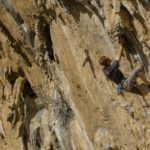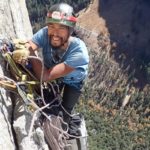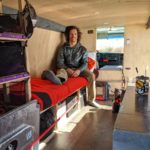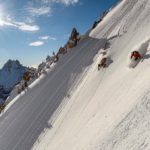Having just turned 18 years old, Ben Hanna spends his time quietly putting up some of America’s toughest sport climbs. He made a splash at this year’s Psicocomp (watch Ben in action, climbing 5.14 50 feet above water), where he tested his skills against the world’s best men’s competitors and pulled out a third-place finish (only losing to the eventual champion). He has also demonstrated his prowess throughout his career in youth competitions and on real rock, where he’s scouting, bolting, and sending hard 5.14 first ascents.
In this interview, you’ll find that Ben is deeply committed to his training and growth as a climber. He harnesses the dedication, mental fortitude, and physical capabilities to progress our sport forward—to continue pushing the bounds with first ascents at the highest level.
Quick bites
- Born: 1998
- Hometown: Santa Fe, New Mexico
- Started climbing: 2 or 3 years old
- Favorite style: juggy, hard sport climbing
- Proudest ascent: Enemy T (5.14+) at the Bat Caves, New Mexico
- Go-to crag snack: Smore’s Pop-Tarts
- Favorite band: Bad Religion
Tell us about your introduction to climbing.
We were living in Santa Fe and we’d go out almost every weekend, skiing during the winter and climbing during the summer. My dad didn’t really want to give up his outdoor life, so as soon as I could walk I was skiing.
Then when I was about eight years old, my dad decided that we were going to be strictly rock climbers and we just started climbing every weekend—that became my life.
At first I wasn’t terribly fond of it. When the others were climbing I’d go exploring and play imaginary sword fights with sticks in the woods … that was also really fun.
Then when I was 10 years old, I met my best friend, Quincy Conway, and he was a competitive climber on the local team. That was when I got really into it, mostly because I was able to climb with another kid my age. It wasn’t such an adult thing anymore. And also, I was really proud of my climbing so when I met a kid that was better than me, it was like, Oh man, I can’t let this be. I have to get better, I have to get stronger!
So I joined the team and just got super psyched. A few months after joining I didn’t know what I’d do without rock climbing … It was all I looked forward to.
Was it competition that got you so psyched on the sport?
It was, definitely.
And how has your relationship to competitions evolved over the years?
I find the competition aspect really fun, but I like outdoor climbing more. Outdoor climbing is why I climb.
But it’s cool because I train and I compete and that keeps me motivated. Then on weekends and in my free time I go climbing just to be out in the woods and enjoy climbing for climbing.
A lot of our audience might not be too familiar with the youth climbing scene. Could you shed some light on the environment there? What are the best and worst parts?
The best part about the youth climbing scene is how well it brings a bunch of kids of the same age with the same drive and passions together. I’d say almost every one of my friends I’ve met through competitions. My non-competition friends I can list on one hand.
So in my teenage years, half of my excitement for comps was like, Man, I can’t wait for the competition, and the other half was that I just couldn’t wait to see my friends.
The worst part … that’s hard.
I guess there’s a lot of politics that go along with it, but you don’t notice it until you’re older. It’s just a part of the process as the sport is developing.
At 18, are you moving beyond the youth climbing scene?
Yeah, I just made the decision last week to not do my last year of youth bouldering. I also decided not to do youth World’s, but that was for other reasons. I do really want to do youth lead at World’s next year but overall, I’m at the point where I’m ready to move on.
What about school—how do you balance your climbing life with real-world non-climbing responsibilities?
 What responsibilities? [laughs]
What responsibilities? [laughs]
In eighth grade, I went to a program where they started kids off in high school early. And I hated it; it was absolutely miserable. Hated the kids, the high school. I have a real big problem with authority and people telling me what to do.
With my family, they’d give me boundaries and help me understand why. But in high school, it was more like do what I say because I say so. I couldn’t stand it. So I moved to the community college as a home schooler, and I take my home school classes, which are actually at the community college.
This decision was partly because I just couldn’t stand high school, and partly because it freed up so much time for me to rock climb. So it was a win-win and because of that, I was able to train a lot more and focus on my true passions … what I really want to do with life.
Does any part of you ever wish you had a more typical high school experience?
All the time.
Like I said, I don’t have many super close non-climber friends. I went to a football game and thought, There are so many teenagers here … it’s so weird.
But then I go rock climbing on a Monday morning at 8am and feel that’s it’s so much better. It’s so worth it.
What about training—it seems that it’s a big part of the youth climbing scene. What does training look like for you?
I started training with a new coach when I was 13 or 14, named Ed. He had a home wall so I’d go to his house at 6am and train before my 9am class. I’d go to school, come home, and then train after school with the team. He was my coach and climbing partner. It instilled an important relationship and respect for training.
If you train really hard, you’ll see results.
He then took another job and took a step back from training, so I had to start training by myself for the next year.
About a month ago, I started working with one of the reps for my shoe company, Butora. He’s a coach and I have a home wall, so I began training on there with his coaching. That has been working really well.
Could you give an example of what a training session might look like?
The thing I do the most is circuiting. I’ll make up a 40-move sport climb on my home wall that just goes in circles, doing laps around the wall. Every time I finish it, I’ll make it either harder or longer.
A normal session would be a warm-up on an easier version, maybe 5.12 or 5.12+. Once I’ve done a few laps and feel warm, I’ll then start doing laps on the harder version. I’ll get on it and go until I fall and then get right back on and try to finish it no matter how many times I fall … I get as pumped as possible. I do six sets of that with an eight-minute rest between sets.
Depending on what part of the season it is, I’ll either do dead hangs on the hangboard, a ring workout, or abs. Sometimes I combine them for a full-body workout and that takes an hour or two.

Specifically, what are you doing for your core?
I do deadlifts and I really like bicycles. I also do—I’m not exactly sure what they’re called—but I call them badass situps which are like a normal crunch but my legs are also off the ground. I’ll extend my legs so my back almost touches the ground then I’ll come back into a ball. I do like 25 and it kicks my ass.
For the 40-move circuit, are you taping holds or just memorizing the sequence? If someone wants to do this at the gym, how do they keep track of the climb?
I’ll just memorize it, but the first time I make it, it’s usually just 20 moves long. Then I’ll spend a full day working on it to make the 40-move sequence, maybe adding five or ten moves at a time. The thing about that is that it really works best on a home wall or systems wall since gym problems change so often.
What does your home wall look like?
It’s my idea of a European-style training wall. A 45° with two walls around it: one 30° and a slab with a roof. I filled every T-nut with bolt-ons and I put screw-on holds in between so there’s literally no empty space . I’m taking a woodshop class at school, so I get credit to make wood holds!
What does a typical week like in terms of climbing, training, and rest?
When I didn’t have a coach, I would climb every single day. I set at two different gyms so I’ll sometimes set three days a week, climb three days a week, and train three days a week.
It’s usually one session a day, but my goal is to do two training sessions on training days.
What does the training schedule look like?
I typically train Monday, Wednesday, and Friday.
So you’ll train, climb two days on the weekend, and train again?
Yes, I’ll train Friday, climb Saturday and Sunday, then train Monday evening.
And by that time my hands are so raw, it’s usually the most miserable thing on the planet.
I take two rest days per week. I wish I didn’t have to, but it’s part of getting stronger.
What’s your plan after you finish school?
I’ve always wanted to be a professional climber. I was about 10 years old when I told my parents this and they both jumped on it, saying, “If that’s what you want, then we’ll support you however we can.” And they have.
Do you have any intentions for college? Or is all your effort is being placed in your climbing career?
Right now, all my energy is being put toward a climbing career. I’m going to graduate with an associate’s and I’ve thought about staying in Santa Fe for two more years to get a degree in business and marketing.
I’ve also been trying to gain as many skills as I can in my high school career so that even if being an athlete doesn’t work out, maybe I’ll just go live in a van … and I’m psyched on that too.
We have a friend staying in our house right now that has all these skills and he calls it the art of vagabonding. He’s a master of living off nothing. He travels around and has so many skills that he can work wherever he wants, going wherever he pleases, and finds a job doing whatever.
He’s happy and psyched and I’ve started to look up to him—it shows how you can be really happy without needing a stationary job.
What’s the most difficult part about establishing yourself as a pro climber?
Sometimes I feel like I’m just not good enough—get stronger is always the goal.
It seems doubt can be a pretty common theme in professional climbers though—is doubt a motivator for you?
Totally. It’s a huge motivator. Sometimes, when I don’t want to get out of bed or I’m hanging out with friends, I think I could be training. The self-doubt and a lot of self-loathing makes me train harder. It’s kind of dark and doesn’t sound good, but it’s the truth.
I think it’s just a part of being human … having doubt and being self-conscious.
For all things bad, it’s a matter of whether you use it to make you stronger or let it pull you down.
For all things bad in my life, I try to come out stronger.

The career path of being a professional—there’s no road map for it. It seems it can be pretty fuzzy …
Exactly, and that’s the thing for me. As I’ve been growing up I’ve known this is what I want, but how do I get there?
And there really isn’t a clear path. You see the best climbers out there and they have no recognition and then there are other climbers that are not as strong and they’re making bank and you’re like, Wait, what makes some people more famous than others? What makes some people able to make a living off this more than others?
So what is it—what does it take to be a professional?
I always thought if you wanted to be a professional rock climber, you had to be the best.
So I thought I could either be the best rock climber out there and send the hardest projects or I could become a comp climber and win competitions and get media attention.
But as I’ve grown up and seen the sport develop, I think something really important is that you’re either really good at marketing and selling yourself or you’re creating media by filming expeditions, where you’re climbing, and spraying about the climbs like, Look at me, look at me. And part of me enjoys climbing outdoors by myself. I went to Boulder and there were a million people climbing out there by the crag and I couldn’t handle it.
That’s tricky, because once you’re concerned about the media you create, it doesn’t seem so personal?
Exactly. And also, am I, as a pro climber, putting myself ahead of everyone else and kind of being selfish by spraying about all these wonderful crags that no one is at right now? If I’m filming it, spraying about it, and getting thousands of people to look at it … is that wrong?
I think this was less of a problem four or five years ago, but now that climbing is in the Olympics and there’s this massive growth, I’m personally worried about the amount of people that will be coming outside.
You mentioned the Olympics—what’s your opinion of climbing being included?
Part of me is really happy because like I said, I always thought you could become a pro climber through competitions. And the Olympics make it really easy to get that attention; more people will want to watch you, more companies will endorse you. There’s going to be a bigger market for competition climbers that want to make it their living and I think that’s great.
Honestly, I don’t see many downfalls to it, but I worry sometimes about whether or not the sport can handle the growth.
What are you currently focused on?
I’m really focused on a climb I bolted last year. I projected it almost every weekend and it was just out of my reach. I want to train really hard, get super strong, and go climb that.
Not many 18-year-olds are developing routes. Could you talk about your draw toward development?
I really love climbing for climbing, but I also really love climbing things that haven’t been done before. It’s the adventure aspect. I think it’s so cool—there’s something so amazing about finding a climb and thinking, Wow, I can do this. And no one has done it before. I could put a bolt on that and I could climb it. It’s unchartered territory.
A lot of why I’ve wanted to be a professional climber is watching those videos of Chris Sharma go do crazy things in new territory. Basically, that classic Chris Sharma movie: he goes out, finds something impossibly hard, fights with it for years and it’s this epic battle and finally he conquers it and wins. It’s such a heroic story and I totally fell in love with it. I thought, I want to do that!
I became obsessed with finding climbs that seemed impossibly hard and training and obsessing over them for years.
And trying to be my own Chris Sharma. All my proudest ascents are multi-year projects and that process is so drawing to me. It’s a heroic story—you don’t have to fight any dragons but it is a quest.
In closing, what are you working toward? Any mega-projects on your radar?
I’ve always wanted to climb Jumbo Love (5.15b)—that has been one of my goals for a very long time.

Explore more
- This week’s best rock climbing gear deals
- Our 30+ most popular articles ever
- Climber Spotlight: Beth Rodden on Redpointing Tips, Training, Nutrition
- Climber Spotlight: Chris McNamara
- Climber Spotlight: Corbin Usinger
- Interview with Hobo Greg: A “Hitchhiking Mad Man” Living in Joshua Tree
- What’s In Your Pack: Peter Croft on Gear and Alpine Efficiency
- What’s In Your Pack: Ethan Pringle
- Get daily updates by Liking us on Facebook
- Free rock climbing PDFs on technique, training, knots, and more










